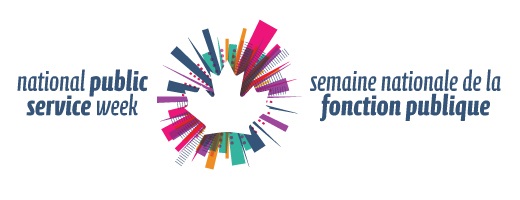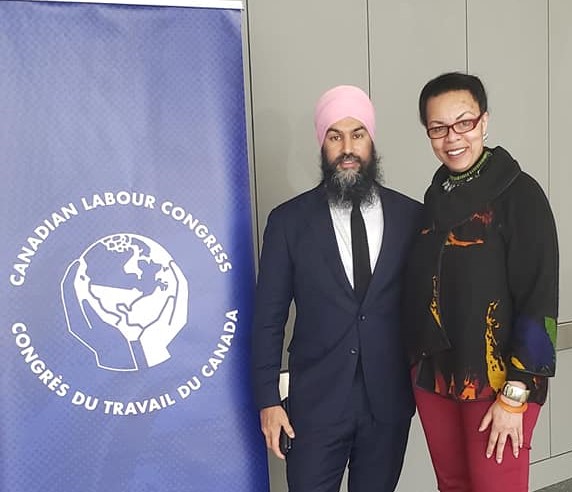President Debi Daviau signed the agreement with Treasury Board that provides compensation to all PIPSC members paid by Phoenix. The agreement details were announced earlier this month.
This agreement provides each member paid by Phoenix with five days of paid leave in compensation. Members will have a claims process to receive every dollar that they’ve lost due to Phoenix, as well as a mechanism to be compensated for its damages.
Days of leave and the updated claims process will come into effect 150 days after signing, November 12, 2019.
The Treasury Board and 15 public service unions finalized this joint agreement that will compensate 146,000 current and former employees who were paid by Phoenix.
READ THE NEWS RELEASE
The agreement applies to employees, retired employees, former employees and the estates of deceased employees. Separate agencies are expected to duplicate this agreement shortly.
Answers to your frequently asked questions on this Phoenix compensation agreement are available now.
PHOENIX FAQs
Despite not getting paid properly, our members have come to work each and every day to give their best in service of the public. We can't erase the loss and suffering that Phoenix has caused for these dedicated public service professionals. But with the commitments and the compensation enshrined in this settlement, the Treasury Board has taken important steps forward.
For support in dealing with your individual Phoenix case please contact our PIPSC Phoenix Team.

Fellow members,
Each day you go to work to protect and serve Canadians in a hundred different ways: you save lives, protect the environment and grow the economy.
You make important contributions as both public servants and union members.
Together we continue to accomplish great things. Every day, PIPSC stewards and members work together to protect your rights and ensure a workplace that supports your excellence.
Our recent wins at the central bargaining table will improve the lives of PIPSC members for years to come. Our fight to replace Phoenix continues to move forward and members are getting compensated for the hardships created by Phoenix. I hope you'll join me on June 12 for a union-wide telephone townhall to discuss these important issues.
Our solidarity is what makes us strong. We are better together.
PIPSC membership is focused, knowledgeable and engaged – that’s how we get results.
Congratulations on your excellent work, your immeasurable contribution to Canadian society and your commitment to our union.
Happy National Public Service Week!
In solidarity,
Debi Daviau
President, PIPSC
The Ontario government has introduced legislation to cap public sector wage increases at an average of 1% annually for the next three years.
We are appalled by this legislation and any form of legislated wag caps. Legislating wages interferes with the right to free collective bargaining.
Our members, as all workers, deserve wages that reflect the real cost of living. A 1% annual increase means your wages will be worth less each year. Collective bargaining has allowed the employer and our members to jointly determine sustainable levels of compensation for decades.
The new wage cap would include teachers and staff at post-secondary institutions and hospitals. It will affect both unionized and non-unionized workers.
In addition to some 240 Information Technology professionals at the University of Ottawa, the Institute represents over 400 professional workers in the Ontario health sector including:
- Ontario Medical Physicists employed by the Regional Cancer Centres Employers Association (MP);
- Mechanical and Electronic Technologists employed by Sunnybrook Hospital (SUN-MET);
- Radiation Therapists employed by Sunnybrook Hospital (SUN-RT);
- Radiation Therapists employed by the Juravinski Cancer Centre (JCC-RT);
- Radiation Therapists employed by Thunder Bay Regional Hospital (TBH-RT);
- Radiation Therapists employed by Windsor Regional Hospital (WRH-RT).
Over the last month we have seen our hard work pay off! Join one of three telephone town halls with President Debi Daviau for updates on both Phoenix damages and the central bargaining wins. There will be an opportunity to ask questions.
Date:
Wednesday, June 12, 2019
Time:
6:30 PM – 7:30 PM ET (English)
7:45 PM – 8:45 PM ET (French)
9:30 PM – 10:30 PM ET (English)
How to participate:
You will receive a phone call on June 11 inviting you to join the call or the details will be left as a voicemail.
You may also dial directly into the call at the appropriate time on June 12:
English
Number: 1-877-229-8493
Passcode: 112851
French
Number:1-877-255-5810
Passcode: 112851
Or you may stream the audio of the call online through your computer or mobile device: https://video.teleforumonline.com/video/streaming.php?client=12851
We look forward to connecting with you soon.
The Institute’s Legacy Foundation would like to remind you that the deadline to submit a scholarship application is July 12, 2019.
In 2019, the Foundation will award the following scholarships:
- one $5,000 scholarship
- twenty-seven $1,500 scholarships
- three $1,000 scholarships
- four $750 scholarships
- one $500 scholarship
Eligibility
To be eligible, applicants must be children or grandchildren of Regular or Retired members in good standing or members who were in good standing at the time of their death. Children or grandchildren of Rand deductees are not eligible.
Applicants must be entering their first year of post-secondary education in autumn 2019 in a full-time post-secondary program at an educational institution (including cégep) in Canada or outside Canada.
Evaluation
The basis of selection is the same for all scholarships. Only one scholarship will be awarded to each of the chosen candidates. Applications will be evaluated by an impartial selection panel using these factors:
1. Academic achievement (most recent report card or transcript of marks).
- Summary of candidate’s leadership ability and community service involvement, including a minimum of 2 letters of reference (e.g. student council, tutoring, coach or assistant coach, other volunteer activities).
- Essay of 750-1000 words on "professionalism". A suggested topic is "What does it mean to be a professional in your career?" but other specific topics on professionalism are welcomed. Essays will be judged on content, grammar, spelling, organization and presentation.
- Typed statement by the candidate outlining future education and career goals and indicating why the candidate deserves a scholarship. This statement will be evaluated on content, grammar, spelling, organization and presentation of goals.
More information can be obtained at www.pipsc.ca/legacy or by email scholarship@pipsc.ca.
Application Procedure
A complete application must include:
- A copy of the official transcript of marks from the learning institution most recently attended.
- A statement outlining future education and career goals and indicating why the candidate deserves a scholarship.
- A statement about the candidate’s leadership abilities and community service involvement with supporting evidence, including a minimum of 2 reference letters.
- A 750-1000 word essay on professionalism.
Please submit the scholarship application online [ https://pipsc.smapply.io ]. All applicants, successful or otherwise, will be notified by the Evaluation Committee. Awards will be applicable to the academic year commencing in September 2019.
The successful candidates will be notified by mid-September 2019. A cheque will be forwarded to the successful applicant once confirmation of enrollment in a post-secondary institution is received. Please note that the Foundation may use photos and names of recipients in promotional material.

Labour leaders from across the country gathered in Winnipeg last week for the Canadian Labour Congress (CLC) Canadian Council and to mark the 100th anniversary of the Winnipeg General Strike.
Vice-President Norma Domey attended representing PIPSC. VP Domey delivered a presentation reporting back on the Canadian Labour delegation to the UN Commission on the Status of Women in March.
The over 35,000 Winnipeg public and private workers who united to send a clear message to employers and to governments in May 1919, were acknowledged and celebrated! They went on strike for six weeks in order to win better wages and the right to collective bargaining.
To honour this powerful legacy of the Canadian labour movement, the CLC premiered its new film Stand!. Stand! tells the story of the Winnipeg 1919 strike and how workers overcame cultural and gender division to organize and win together – some relevant lessons for today’s struggles.
Take a moment and enjoy the trailer of this important Canadian film.


Launch of new Federal Public Service Workplace Accommodations Study, May 6 to 24, 2019
Dear colleagues,
The Office of Public Service Accessibility at Treasury Board Secretariat is conducting a study of existing workplace accommodation practices in the federal public service. Its objective is to identify common experiences, best practices and opportunities to remove barriers and improve workplace accessibility. Information gathered from this study will provide a baseline that can be used to measure progress as improvements are delivered over time.
The first phase of this study is a survey intended for current federal public servants who requested a workplace accommodation for themselves or for one of their employees in the past 3 years. Between May 6 and May 24, employees and supervisors can provide their comments directly through this online survey or review the questions in an accessible Word format and respond by email at accessibility.accessibilite@tbs-sct.gc.ca. Links to the online survey and accessible versions are available on the OPSA GCPedia page, using a Federal Government computer. If you are not able to use the link, you can also use the MS Word version of the survey (attached) and send your completed survey by email to accessibility.accessibilite@tbs-sct.gc.ca
The PIPSC Human Rights and Diversity Committee (HRDC) is committed to helping build awareness about accessibility issues and promoting an inclusive and welcoming work environment where all public servants can thrive. We encourage all PIPSC members to participate in this study. Please do not hesitate to contact me or any member of the HR&DC if you have any questions or comments.
In solidarity,
Waheed Khan
Chair, HRDC
Director, NCR
A report released yesterday from the Parliamentary Budget Officer (PBO) confirms what we have been saying since November 2018 – Phoenix must be replaced and a new system can be cost effective.
Throwing good money after bad is not a viable strategy. Continuing to give money to companies like IBM to patch a broken system has to have an end date. Had the previous government listened to the advice of its own public service professionals, we could have avoided the Phoenix mess altogether. So much unnecessary pain and suffering has been caused to Canada's public service employees, and so much financial loss to all Canadians.
The costs of the current Phoenix pay system have skyrocketed due to cascading mistakes made throughout the outsourcing of the project development and rollout.
But looking at past mistakes isn't enough.
The government is currently in the process of identifying a replacement to the pay system and PIPSC is proud to be a leader in that process. We believe that if the new pay project is done free of ideology and in consultation with public servants, the cost will be reasonable. Although the PBO report does not factor in all that needs to be considered in new integrated HR-to-Pay system, it does demonstrate the urgent need for a new system.
We are pushing for the new pay project to move forward as quickly as possible and Treasury Board has indicated a pilot of the new NextGen HR-to-Pay system will be launched this fall.
I will be pushing the federal government to make a clear monetary commitment before the federal election so that work can continue on the NextGen HR-to-Pay project. Moving quickly on building a new pay system needs to be seen for what it is, a win-win-win situation, for public service employees, the Federal Government, and Canadian tax payers.
Better together.
Debi Daviau
President
On May 15, 1919, over 35,000 Winnipeg public and private workers united to send a clear message to employers and to governments: they would strike in order to win better wages and the right to collective bargaining.
Workers overcame cultural and gender divisions to organize and effectively shut down the entire city of Winnipeg for six weeks while maintaining key services. Women were at the forefront – among the first workers to walk off the job.
While the strike was eventually broken and many of its leaders were imprisoned or deported, it left a legacy of labour law reforms that redefined fair and safe work across the country.
We have a far stronger social safety net than those workers could have ever dreamed of. We have universal health care, minimum wages, old age pensions, and employment insurance. We have maternity leave, weekends, health and safety standards, due in part to their sacrifices.
With a changing economic landscape that continues to threaten certain industries and create whole new ones, the key lesson from the 1919 Winnipeg General Strike must be for workers to overcome fear and division to unionize and safeguard their rights.
Canada’s unions are proud of the contributions they have made to raise the bar for everyone. We are committed to advocating on behalf of all working families – for universal pharmacare, pay equity, better pensions, safer workplaces, and much more.
But if history has taught us anything, it’s that we need every worker to stand up and be counted.
Read more from the Canadian Labour Congress as published in the Winnipeg Free Press and in the Toronto Star.
The United Nation’s General Assembly voted in 1993 to make May 15 an annual celebration of the International Day of Families. This day provides an opportunity to promote awareness of issues relating to families and to increase the knowledge of the social, economic and demographic processes affecting families.
In our own work at PIPSC, we are fighting for improved family leave at the central bargaining table that allows you to give your best at work and in your family.
We celebrate all the diverse family compositions that make our society so rich. At the central bargaining table we are specifically advocating for equitable leave for adoptive parents along with gender-neutral language that includes same-sex parents and non-binary parents.
President Debi Daviau became a union activist through her own personal fight for family leave. Read more about her experience and our work on family leave in President Daviau’s opinion piece published in the National Observer.
Show your support for improved family leave by participating in or hosting a Do Better action in your workplace in May.

